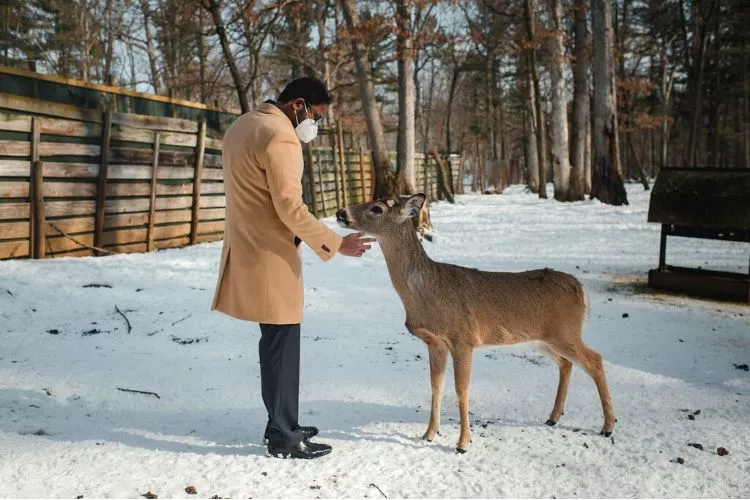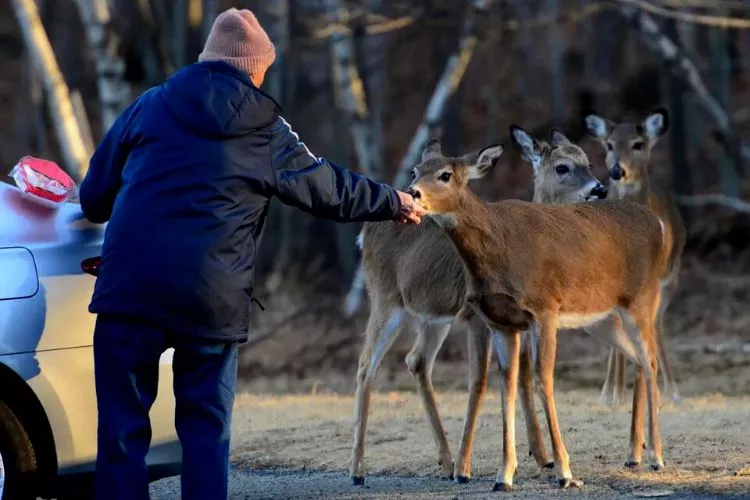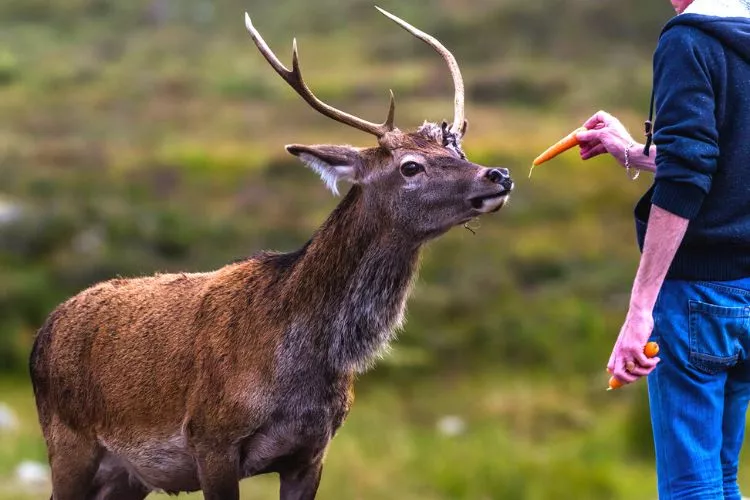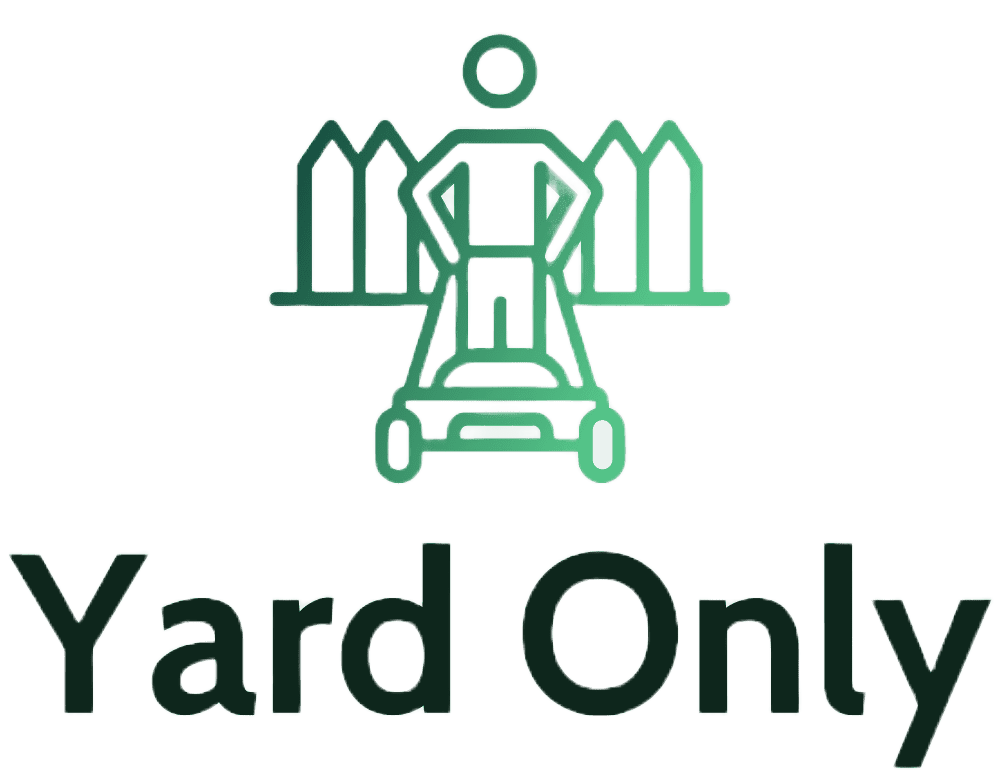Providing food to deer is a great way to attract them to your yard. Deer love to eat fresh fruits and vegetables, and if you have a garden then it might be damaged by deer. However, you can save your garden by putting out food, especially for the animals.
Many people also opt for feeding deer during the winter months. You can feed deer foods like acorns, alfalfa, corn, nuts, and oats are good for deer. We cover more deer feeding in this article.

Is it illegal to feed deer in your yard?
Though deer feeding in your backyard is not harmful per se, deer are wild animals and if they frequent your backyard they might cause property damage. The only reason deer feeding is discouraged is because the animals might become dependent on humans for food.

However, whether or not it’s illegal to feed deer in your backyard is a controversial topic. There are two types of deer migratory like the white-tailed deer and non-migratory deer including elk and moose.
Most often it’s illegal to feed migratory deer throughout the year, however, there are certain exceptions during the winters and the legality varies from one state to the other.
Should you feed backyard deer?
This is a legit concern during the winters as we try to find ways to help the animals during the harsh weather conditions. Some states in fact allow deer feeding during winters.
However, it’s best to do it in a way so that the animal does not become dependent on humans. Filling out a feeder with some grains and leaving it in the backyard is the best approach.
What To Feed Deer In Backyard?
Once you decide to feed the deer in your yard, provided it’s not illegal in your state, you need to determine what you will want to feed them. Since deer are wild animals, they might not be able to digest a lot of food that you might offer.

Thus, keeping the animals’ health in the account, you need to come up with a few feeding options.
1. What do you feed wild deer in the summer?
The food you offer to deer during summer will be different than the ones during winter. Most often deer require food that is high in fiber and low in protein. Keeping that into account, it’s best to provide them with fruits and vegetables during the summer. It’s necessary to avoid feeding them corn.
The best way to feed deer is to allow them to go through the vegetation or garden to choose their food. That way they don’t become dependent on people.
Of course, you have to consider the nutritional value of the food you are giving, and also keep into account the dangers of overfeeding.
2. What to feed deer in spring?
Deer most often require an increased amount of protein during the spring as they prepare to breed. In such cases, you can provide them with acorns, soybeans, oats, and turnips. However, it’s also important to balance it with vegetation as deer enjoy having them.
3. What to feed deer in winter?
To feed deer during winter months there are a few factors to be considered. First, you need to select an ideal food source that has a sufficient amount of nutrients. These can be corn, nuts, and fruits. These foods provide sufficient energy to the deer to help them survive the winter months.
Next, you need to determine the ideal location to set up the feeder. It’s best to have it under a shelter, so the deer is comfortable while eating from it and does not get frostbite.
Finally, monitor the feeder to ensure there is no spoilt food in it or else it might affect the deer adversely.
4. What to feed deer in the fall?
What you can feed the deer during fall will depend on what’s available in your locality.
As the fall arrives the days get shorter and the nights get longer and the deer start to prepare for the winter months. In places where the winter conditions are harsh, deer have to eat food that builds their fat reserves to stay warm and have a store of energy to survive the winter months.
If possible you can feed deer acorns during the fall which are high in carbohydrates. They also prefer grass and shrubs. You can also give them hay in moderation if you don’t have a lot of vegetation in your area.
If you are interested to attract hummingbirds and butterflies to your yard: Do Hydrangeas Attract Butterflies? | Do Hummingbirds Eat Seeds?
Frequently Asked Questions (fAQs)
Will deer eat vegetable scraps?
Yes, they do. In fact, they love vegetable scraps since they are low in carbs, rich in protein, and have high water content.
Can deer eat bread?
While a small of white bread cannot harm a deer, if it ends up eating a few slices, it might lead to lactic acidosis, which is a life-threatening condition. It’s best to avoid giving out bread to be on the safe side.
What fruit do deer eat?
Most often deer enjoy having pears, apples, plums, and strawberries.
Can deer eat birdseed?
Deer do eat bird seed but it’s not a preferred food for them. Most often deer eat birdseed if there is nothing else to eat. So, if you want to feed deer in your backyard, give them fruits and vegetables.
Can I feed deer lettuce?
Yes. Lettuce is a good source of vitamins A and C. It also has potassium and fiber. Deer seem to enjoy having lettuce as well.
Are salt licks good for deer?
Yes. In fact, deer are attached to salt licks and they are often an important part of the deer diet. Sodium is not common in nature and thus having a salt lick for deer is good. Other than sodium, salt licks have other essential nutrients like iron, zinc calcium, and phosphorus.
What is an inexpensive way to feed deer?
Indeed feeding deer can be costly. However, there are a few budget-friendly options like fallen fruits, vegetables, nuts, oats, corn, and alfalfa.
Conclusion
Though some states do not allow deer feedings, if you are in a state that does, provide the food we have mentioned in this list. Additionally, have some shed in your yard for the deer to rest during the winter months.
